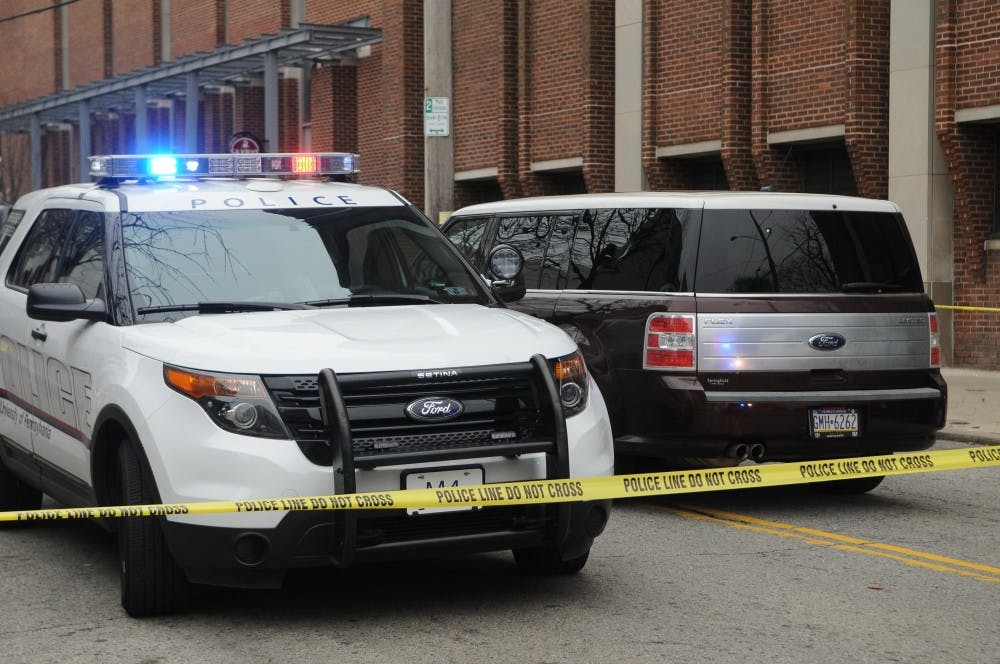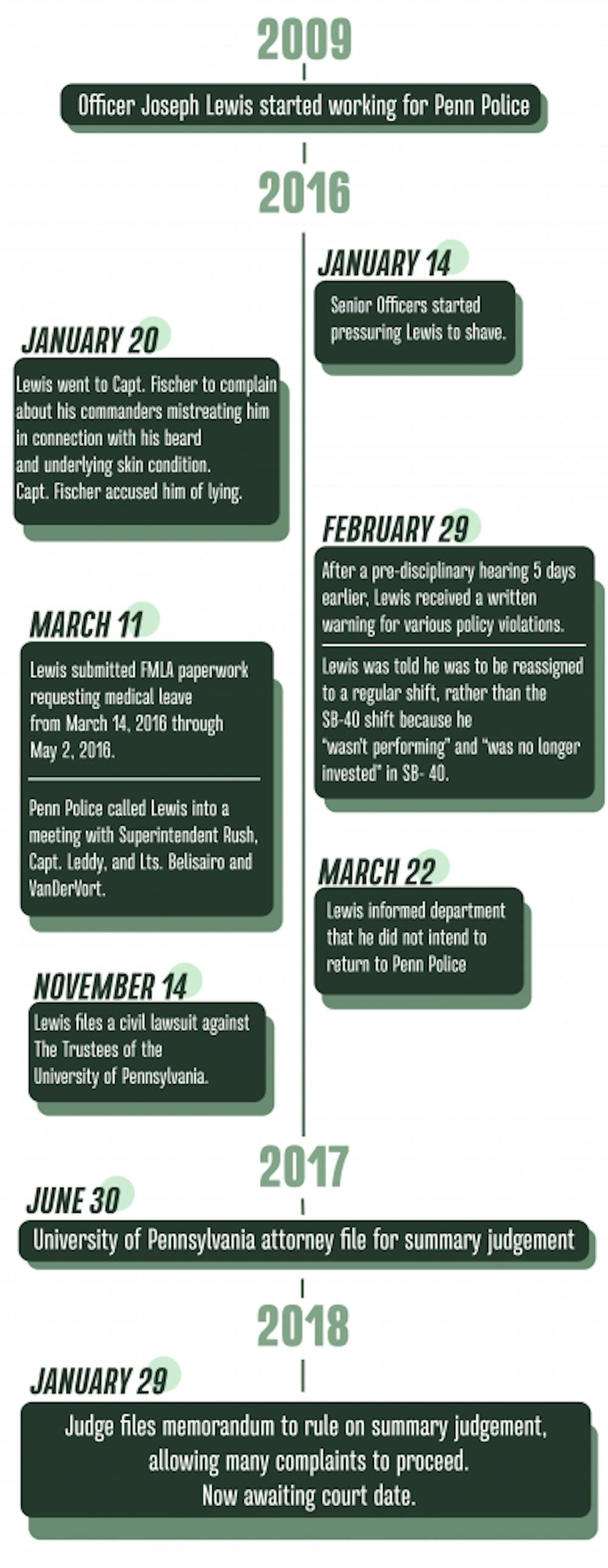
An ongoing discrimination lawsuit between a former police officer and the University has been allowed to continue to a jury trial, despite Penn's efforts to dismiss the charges.
On Jan. 29, presiding Judge Gene Pratter of the United States District Court for the Eastern District of Pennsylvania ruled in favor of some of Joseph Lewis' claims allowing them to proceed to a jury trial.
Pratter allowed half of the claims to move forward and granted summary judgement on the other half for the University. The claims that will be pursued in front of a jury include one of discrimination in accordance with the Americans with Disabilities Act.
Lewis, a six-year veteran of the force, first sued the University in 2016 for racial discrimination. He claimed his ultimate dismissal from the police force was motivated by his refusal to shave his facial hair, a task that is painful to do when suffering from a skin condition known as Pseudofolliculitis Barbae. The condition predominantly affects black men, including Lewis.
The Penn Police Department, like other police organizations, regulates various aspects of employee appearance including facial hair. Directive 45 requires that beyond mustaches or sideburns, all 120 Penn officers must be clean-shaven, unless they are given a special dispensation for a beard due to a special assignment or a medical concern.
Lewis claimed that he suffered various "adverse employment actions" due to his PFB including the department's investigation into his license. Penn Police countered that none of these incidents constituted an adverse employment action on their own.
"Penn Police is correct that none of these actions on its own is an adverse employment action; however, a reasonable jury could conclude that Penn Police took these actions for discriminatory reasons and, when viewed in the aggregate, that they affected the terms and conditions of Mr. Lewis's employment," Pratter wrote in her ruling. "Penn Police only began disciplining Mr. Lewis after he grew a beard and, subsequently, requested a waiver from shaving."
Pratter noted that the best evidence for the link came from the second deposition of Maureen Rush, the vice president of the Division of Public Safety and the superintendent of Penn Police, when she admitted that she began the department's investigation into Lewis.
"Here's the deal. He had facial hair that I observed, which started off this whole disciplinary process, right," Rush said during a deposition on Sept. 12.
In August 2015, Lewis requested a medical waiver to the requirement. Lewis' lawyer, Timothy Creech, told The Daily Pennsylvanian in 2015 that at the time, his record had been exemplary.
Officers who request to sport a beard for medical reasons must present an updated certificate every 60 days for authorization and, if approved, must keep their facial hair trimmed to a quarter-inch in length.
"He complied with the requirements of the school and that just wasn't good enough for them," Creech said in a recent interview with The Daily Pennsylvanian.
"I was well-respected; everyone in the community knew me; I had numerous awards; I was a training officer and elevated amongst my peers," Lewis said.
This new legal decision comes after two years of legal struggles.

Lewis alleged that in early January 2016, his senior officers began to pressure him to shave and that his supervisors began to check his beard on a daily basis.
"[The harassment] was mainly from the supervisors and the chain of command under Rush's control; she kind of coordinated that with them," Lewis said. "But some them also got some of other officer's involved, you know, and started making jokes like calling me Taliban and things like that."
The Division of Public Safety said they could not comment on ongoing litigation.
At the time, according to court documents, Lewis was the only officer with an approved waiver. However, two other officers had requested it in the past.
Craig Everage and Dwight Archer had previously each requested at least one waiver to Directive 45. Eventually, both officers said in separate depositions that they chose to shave their facial hair due to the inconvenience and cost of continually certifying a chronic condition and due to the perceived negative reception from colleagues.
According to court documents, Lewis visited Captain Joseph Fischer on Jan. 20 to complain about his commanders mistreating him due to his beard. Fischer accused him of lying about the harassment.
About a month later, officers gave Lewis written warnings stemming from three incidents, namely that he failed to get a new driver's license within 60 days of moving to Delaware, that he improperly responded to an elevator entrapment call, and that he lied about being ordered to "shave or go home" by a commanding officer. Lewis disagreed with the department's version of these events.
The situation culminated in a meeting on March 11, 2016, after Lewis submitted paperwork requesting medical leave from March 14 to May 2. He was then summoned to a meeting with various superior officers including Rush.
"It was kind of a lose-lose for both of us. You are losing this officer that you have all this time and money that you have invested into, and I am losing my seniority, my salary, they way I feed my family, all at one time."
According to court documents, the details of the meeting are disputed by the two parties.
Lewis alleged that at some point, Rush yelled at him and ultimately said, “I’m tired of this, take his gun,” and ordered him to be escorted out of the building. Lewis said he interpreted these events as the end of his employment at Penn and handed in his resignation 11 days later.
On Nov. 14, 2016, Lewis filed a legal complaint against the department.
Various hearings and depositions took place over the following months until June 30, 2017 when the University filed for a summary judgement.
Creech said a court date has yet to be set.
The Daily Pennsylvanian is an independent, student-run newspaper. Please consider making a donation to support the coverage that shapes the University. Your generosity ensures a future of strong journalism at Penn.
Donate







